CHINA
History

History

Cities in CHINA
| Beijing |
History
Prehistory and Antiquity
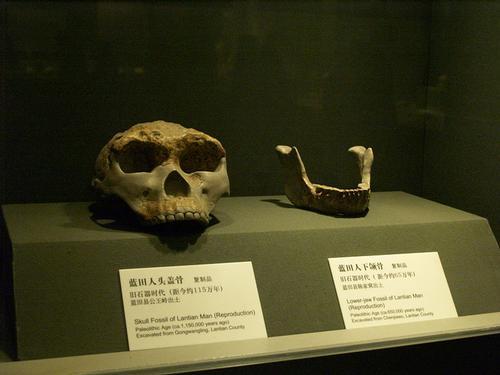
The first remains of human life found in China date from about 700,000 years ago. Bones of this so-called Lantian human have been found at the middle and upper reaches of the Yellow River. The Beijing man is much younger, fossils of this human type date from about 500,000 years ago. In the Neolithic era, about 6000 years ago, the many nomadic tribes finally settled in certain places, worked the land and kept livestock. Examples from this time are the Yangshao and Longshan culture.
The Shang Dynasty is the first civilization to have actual evidence of in the North China plains surrounding the Yellow River, in today's Shandong, Henan and Hebei provinces, and parts of Shaanxi and Shanxi. They made tools and objects out of bronze, cast in earthenware molds. Other states emerged around the Shang's habitat that took over much of the Shang culture, but remained politically independent.
Zhou Dynasty and Qin Dynasty
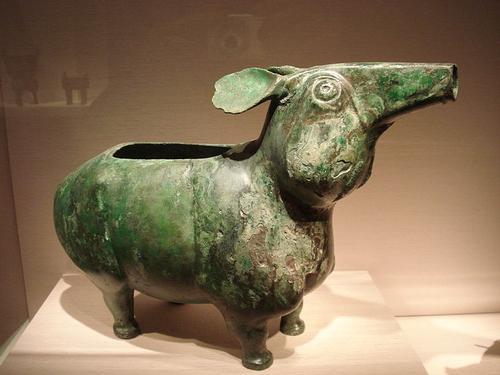
The Shang were defeated by one of these states, the Zhou, around 1050 BC. The Zhou (1050-256 BCE) ruled a very large area through a feudal system, with noble families of the rulers of the various Zhou states holding sway. The empire was so big that a second capital was built in Luoyang. But the size of the empire was also its weakness. The nobles in the remote areas did what they felt like, because there was no strong central government. This made it not difficult for malicious powers to attack and quickly weaken the Zhou. In 771 BC. the Zhou were therefore driven eastwards by "barbarians" and disgruntled subjects.
The Eastern Zhou Dynasty is divided into two periods in historiography, the “Spring and Autumn Period” and the “Warrying States Period”, which frequently waged war among themselves. The Qin, who lived around the western capital, eventually remained as the strongest power and defeated in 256 BC. the Zhou, and the other states in 221 BC. The Qin Dynasty proved to be very strong and powerful and would have a major influence on the further history of China. The founder of the dynasty, Qin Shihuangdi, was called the “first emperor” and was an appealing figure to almost all Chinese. However, he ruled very authoritarian and China was divided into counties and military regions, which were centrally controlled. Rules were even drawn up for the written language and for weights and measures.
Intellectual contradiction was not tolerated, which was one of the reasons why resistance was quickly raised against Qin, who expanded the Chinese areain 214 BC. into present-day Vietnam. In 210 BC. Qin died and his three successors were unable to break the still latent resistance.
Han Dynasty, Tang Dynasty and Song Dynasty
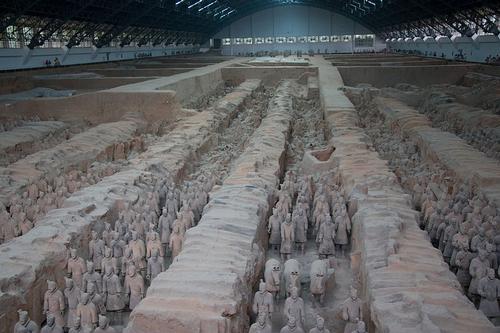 Han dynasty China Terracotta ArmyPhoto: Maros M r a z CC 3.0 Unported no changes made
Han dynasty China Terracotta ArmyPhoto: Maros M r a z CC 3.0 Unported no changes made
After the Qin Dynasty, the Han Dynasty developed, which cleverly took advantage of the popular resistance and became one of the greatest dynasties in China's history. The state was ruled on the basis of Confucianism - every individual and every ruler should pursue the happiness of the other, and proper training and certain rituals are of great importance - and a period of great flourishing of the culture and the science started. Important in this period was also the opening of the Silk Road to the west and the entry of Buddhism. In addition, different regions were much more closely connected to each other, gradually creating a large Chinese empire with its own identity.
The downfall of the Han Dynasty was partly due to the economic rise of the regions around the southern Sichuan Plain and the Yangtse Valley. At one point people felt strong enough to organize rebellions that eventually led to China breaking up into three states: Wei, Shu and Wu. For centuries, these three states battled and waged war for hegemony, resulting in even more fragmented Chinese empire and total chaos. After all, two mighty dynasties emerged from this confusing period, the Tang and Song dynasties.
During the Tang Dynasty (618-907 AD), the Chinese empire grew and flourished as never before. For example, the capital Chang'an (now: Xi'an) had more than 2 million inhabitants, making it probably the largest city in the world at the time. The Chinese empire was also well organized at the time. Laws applied across the country and Confucian schools were established everywhere. Furthermore, there was frequent trade with foreign countries and Buddhism reached its peak. In the same Tang period, Buddhism also experienced a downturn because this outside influence was seen to become too powerful.
Also major political innovations were realized and the initially poorer south became richer. The Tang period was one of urbanization and a thriving foreign trade. Furthermore, many discoveries and inventions were made, but it was also a time of a certain decadence, and China as a military power was not much developed. Buddhism continued to suffer from repression during the Tang period, and thinking in China was shaped by Neo-Confucianism for 800 years.
Ultimately, this period, which also flourished culturally, came to an end due to economic problems. In particular, the increasingly wealthy and powerful country nobility eventually caused the disintegration of the Tang Dynasty, a process that took place over a period of five centuries.
The Song Dynasty (960-1279) brought unity to the torn empire again. However, they soon suffered from raids from the "barbarian" Khitans who conquered the capital Kaifeng from the north in 946 and drove the Song south. This occupation of northern China would last 300 years.
Mongol rule
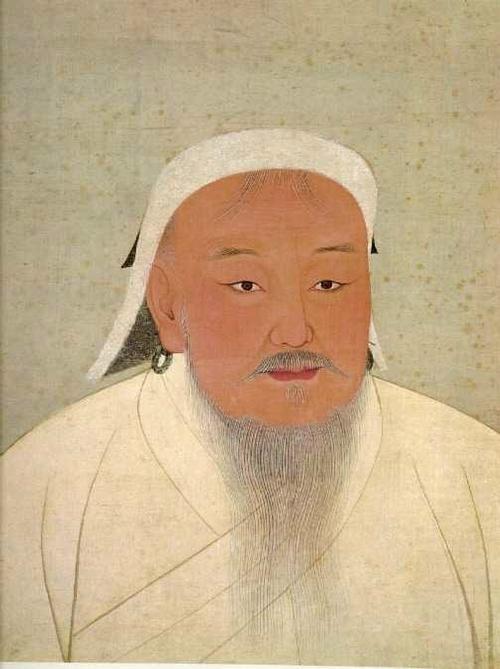
In the thirteenth century, the Mongols managed to conquer all of China. Beijing was conquered in 1215 under the leadership of the famous Djengis Khan. After the death of Djengis Khan, the then Mongolian empire was divided between his three sons and a grandson. Son Ogodai invaded China again and defeated the Khitan rulers in the north. The Song in the South lasted for five decades, but were defeated in 1279 by Djengis Khan's grandson, Kublai Khan. From that time on he ruled all over China and chose Yuan as the name for his dynasty.
Life among the Mongols was not easy for the Chinese. In terms of clothing, traditions, language and food, they had to fully adapt to Mongolian customs. Confucian ideas and administrative politics could be preserved.
The Mongol period was also characterized by frequent contacts with foreign countries, including Islamic Persia and Europe, of which Marco Polo (1271) would become the best known representative. Even Roman Catholicism was introduced as a new religion, and emissaries were even sent to the Pope. In the Ming period, the Catholic Church lost all the gained ground. Even before that time, the Mongols lost their grip on the enormous empire. The empire was also plagued by major floods, famine and rebellions.
Ming dynasty
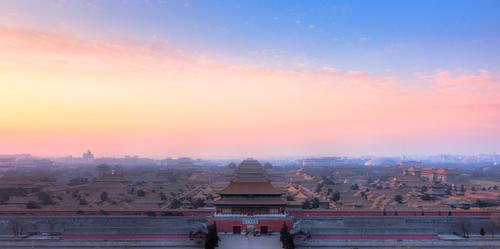 Ming-dynasty China Forbidden CityPhoto: Pixelflake CC 3.0 Unported no changes made
Ming-dynasty China Forbidden CityPhoto: Pixelflake CC 3.0 Unported no changes made
The Ming Dynasty (1368-1644) was to take over from the Mongols, initially led by the founder of the dynasty, Zhu Yuanzhang, who later became emperor. He expelled the Mongols and established the capital in Nanjing. After Zhu's death, a civil war broke out and eventually his son would expel Zhu's intended successor. He would call himself Emperor Yongle and become one of the most famous Ming emperors. As the first act of interest, he moved the capital to his power center Beijing.
Yongle initiated a number of major projects, such as the reconstruction of the Great Wall of China and large displacements to colonize land. Furthermore, the Chinese managed to increase their influence on the important trade routes, the latter led by a eunuch admiral. These lucrative expeditions were halted immediately when the threat of the Mongols and mistrust of the eunuch leaders increased. Chinese citizens were forbidden to travel abroad any longer and China became increasingly isolated.
Manchu Dynasty
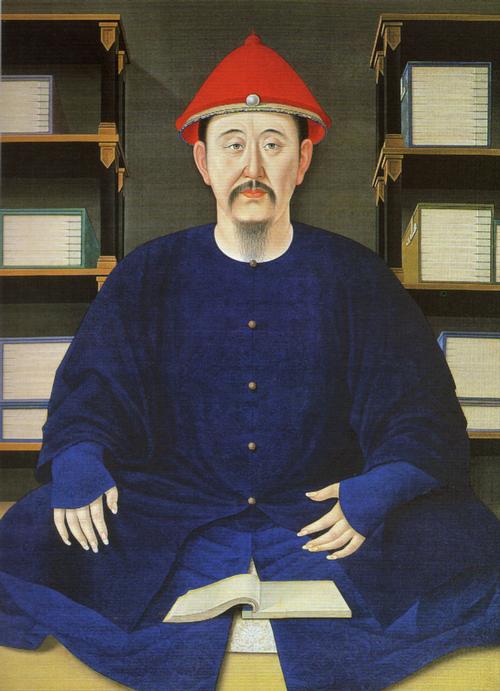 Emperor Kangxi ChinaPhoto: Public domain
Emperor Kangxi ChinaPhoto: Public domain
By the mid-seventeenth century, the state eunuchs became increasingly powerful, and the end of the Ming era was fast approaching. Angry peasants banded together to form bands of insurgents who moved to Beijing and conquered the city. However, this only lasted for a short time because already in 1644 Beijing was conquered by a Manchu army from the northeast.
The Manchus were led by Nurhaci, who had already established the state of Manchuria in 1616. Nurhaci's son, Abahai, proclaimed the Qing Dynasty in 1636, and it was he who captured Beijing from the peasant armies in 1644.
Things became quieter in the Chinese empire under Manchus. Agricultural reforms were completed under Emperor Kangxi (1654-1722), and under his grandson, Emperor Qianlong (1711-1799), the Chinese empire expanded at first, but peasant revolts and increasing Western interference caused much unrest. The major influence of Westerners on trade led to the Nanjing Treaty establishing a certain number of ports for foreign companies, followed later by even more free ports. The Manchus decided to ignore the Westerners, but it turned out to be an almost impossible task. For example, they had a major impact on the “Revolt of Heavenly Peace” that lasted nearly 20 years and cost over 20 million lives.
Some Chinese saw the need for reform, but others resisted any attempt to modernize society. However, many Chinese youths were sent abroad to closely monitor technical developments in the West, and some telegraph lines and railways were constructed.
The imperial concubine Cixi wanted nothing to do with reformers because her son died in 1875; his replacement was then only four years old. When he was eighteen he became the new Chinese emperor who was again very interested in Western ideas and he started the campaign “Hundred days of reform”, among other things he founded the University of Beijing and foreigners were allowed to live in Beijing. That China was completely sucked out by the Westerners at that time was taken for granted. Nevertheless, tensions ran high during the Boxer Rebellion of 1900-1901, in fact aimed at the Manchus, but later also strongly against the foreigners. The rebellion was crushed by an international army, putting China under even more Western influence.
Sun Yatsen
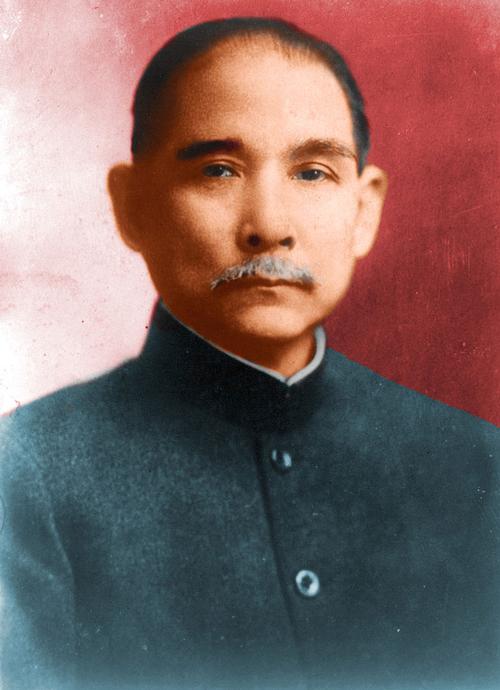 Sun Yatsen ChinaPhoto: Public domain
Sun Yatsen ChinaPhoto: Public domain
Western influences also led to the creation of revolutionary groups, the most important of which was Sun Yatsen, who had experienced democracy in Japan, the United States and England. In desperation, the government announced some more reforms, but it was long overdue.
In 1912, the last emperor abdicated and Sun Yatsen became the first provisional president of the Republic of China. The last emperor was Puyi, only 6 years old (1906-1967). Sun Yatsen wanted to make China a modern, democratic state, but was stopped by the captain of the imperial army, Yuan Shikai. This Yuan managed to become the real first president of China in 1912.
It soon became clear that China had brought in a dictator when he proclaimed emperor in 1915. Yuan died in 1916 and then a bloody war for power by warlords in the north and Beijing followed. Sun Yatsen was heard from the south again.
Period Chiang Kaishek
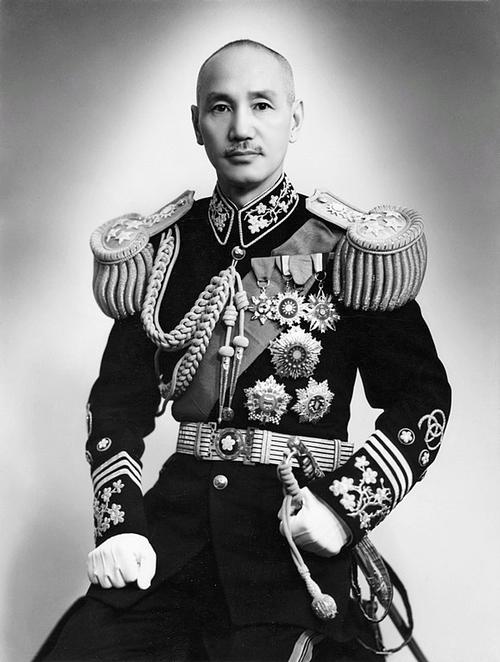 Chiang Kaishek ChinaPhoto: Public domain
Chiang Kaishek ChinaPhoto: Public domain
Sun Yatsen was succeeded after his death in 1925 by the leader of the Nationalist Party of Guomindang, Chiang Kaishek. He wanted to reunite China, which required breaking the warlords' power and driving them away from Beijing.
To do this, the help of instructors from the newly communist Soviet Union was sought. Under the influence of the Soviets, the Communist Party of China was founded in 1921, which joined the nationalists of Chiang Kaishek in 1923. However, this did not go very well and Chiang Kaishek knew that he could only achieve success with the help of foreign countries and the wealthy Chinese industrialists who were strongly against communism and Marxism.
In 1927, Chiang sent his armies to northern China and proclaimed a new nationalist government in Nanjing. The first thing he did next was banning the Communist Party and removing left-wing figures from his party, which often involved much violence. Subsequently, the communists were persecuted all over China and the nationalists tried to destroy the communist army in central China. Under the leadership of Mao Zedong, the communists fled west in 1935, a “Long March” of more than 23,000 kilometers. Tens of thousands of people died of exhaustion along the way, only 10,000 reached their target.
However, because of Japan's expansion drive, both sides faced a common enemy and it was necessary to close a truce. Japan threatened to annex all of China. The fight against the Japanese lasted until the end of World War II. The communists waged guerrilla war from the west and the nationalists, along with the allies, from the southern province of Sichuan.
It will be clear that after defeating the common enemy the old contradictions between nationalists and communists surfaced again.
Farmer son Mao Zedong, meanwhile, had the farmers gotten behind him and the almost inevitable civil war that lasted from 1946 to 1949 was won by Mao. In October 1949, Mao and his army stood at the gates of the Forbidden City in Beijing and Chiang Kaishek fled to the island of Taiwan and established his own government there. On October 1, 1949, the People's Republic of China was proclaimed.
The People's Republic of China under Mao Zedong
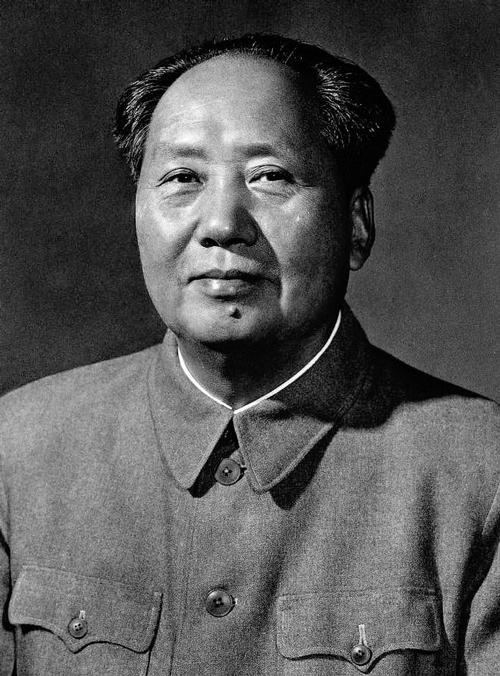 Mao ChinaPhoto: Public domain
Mao ChinaPhoto: Public domain
As regards the internal situation, the first years under Mao were dominated by the reconstruction of the economy and the safeguarding of communist political power. Initially, cautious action was taken against potential opponents, because Mao could still use their support well. Furthermore, the state apparatus and the party organization across the country were anchored in society.
With regard to agriculture, things were immediately tackled thoroughly and the redistribution of the land began, at the expense of the former landlords. Violence was not shunned, and it is estimated that it involved more than 2 million human lives. In 1956, all industries were also nationalized. In the social field, rigorous measures were also taken: efforts were made in every possible way to break through the traditional social structure based on family ties.
In 1953, the People's Republic received an official state structure and a constitution, affirming the leading role of the Communist Party. From 1949 to 1959, Mao held the positions of both party chairman and head of state (from 1969 the post of head of state remained unoccupied and was completely abolished in the 1975 constitution). Prime Minister was Zhou Enlai from 1949 until his death in 1976.
From 1949 foreign policy was characterized by the presupposition of national independence, see for example the occupation of Tibet in 1950.
Initially, Mao was still supported by the West, but this changed after China's support for North Korea. In the war with South Korea, the West became diametrically opposed to Mao's China and the country became isolated. This did not change until after the armistice in Korea and the Geneva Conference on Indochina in 1954. China broke through isolation by posing as one of the leaders of the Third World.
”Great leap forward”
Meanwhile, Mao developed his own variant of communism in which he played a very central role.
From 1956, the collectivization of agriculture was realized in a short time. In order to also align the urban population, a certain liberalization took place, which is necessary in order to be able to implement the radical changes.
However, the criticism continued and even became stronger. When criticism of Mao and the Party was also raised, the well-intentioned campaign ended with the imprisonment of many dissidents.
In 1958-1959, general politics became even more radical and, according to Mao, it was time for the campaign “Three red banners” or “Great Leap Forward”, aimed at bringing industry and agriculture to a much higher level in a short time. However, this failed terribly because of an economic and administrative disorganization, resulting in a terrible famine with approximately one million deaths.
Two consecutive crop failures, floods and typhoons, of course, did not really help, and help from Soviet technicians was stopped by an argument with that country. What did succeed was to establish a minimum level of medical, educational and socio-cultural facilities across the country. The Maoist concept of 10,000-40,000 large popular communes was soon abandoned and replaced by smaller production brigades. Typical things like communal dining rooms were also abolished.
The failure of the Great Leap Forward also led to disagreements at the top of the Communist Party. For example, the defense minister was overturned after criticism of Mao and succeeded by Lin Biao, who turned the People's Liberation Army into a Maoist base. Mao gradually withdrew from daily politics from 1959 onwards, and was succeeded by Liu Shaoqi and Deng Xiaoping, who pursued somewhat more pragmatic and therefore more successful policies.
The relationship with foreign countries was repercussed during this period by the bloody repression of an uprising in Tibet and by border disputes with neighboring India in 1962, culminating in an armed conflict. In 1964 China joined the great powers through the development of an atomic bomb, which was detonated for the first time in 1967. In the Indo-Chinese war, China was cautious and only gave some material support to communist North Vietnam and to communist movements of other countries in the region.
"Great Cultural Revolution"
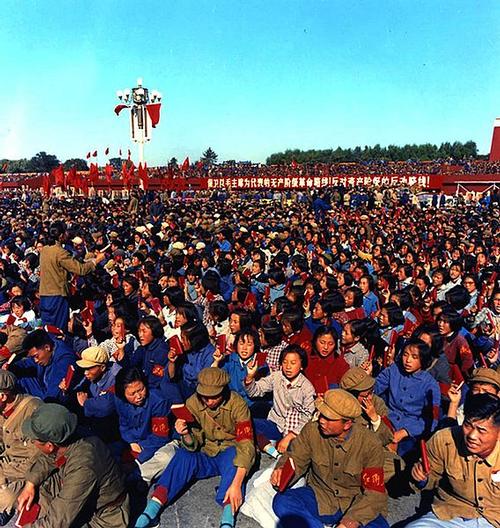 Red Guards ChinaPhoto: Public domain
Red Guards ChinaPhoto: Public domain
In 1966 the Great Proletarian Cultural Revolution started, a mass campaign in which the young people, united in the Red Guards, were called upon to build a new China. This good endeavor, however, degenerated into an iconoclasm and a fury against everything that reminded of “old” China. Historic buildings and museums were destroyed, teachers and intellectuals had a hard time, and children even attacked their own parents.
At some point, the Cultural Revolution threatened to end in a civil war, after which the People's Liberation Army intervened. A new governing structure was announced, with revolutionary committees made up of military personnel, radicals and old party leaders.
The Cultural Revolution was started by Mao when he was losing support for his ideas within the Communist Party. The campaign also targeted the "capitalist" summit of the Communist Party, Liu Shaoqis and Deng Xiaoping. In April 1969, at the ninth party conference, the Cultural Revolution was officially concluded.
Lin Biao became party leader and succeeded Mao, after which a period of reconstruction and reorganization began. Nevertheless, the contradictions at the top of the party were still very much present and the mysterious death of Lin Biao was proof of this. This was followed by several more years of terror and anarchy, and the population was suppressed until Mao's death.
China joined the United Nations in 1971, and relations with the United States improved significantly from 1972, resulting in diplomatic relations in late 1978. Relations with the other world power, the Soviet Union, were very difficult during this period.
In 1950, trade agreements and a friendship treaty were still concluded, but from 1955 the countries became increasingly opposed. In 1960 the Soviet Union withdrew Russian technicians and in 1969 serious border incidents arose. Only in 1986, under party leader Gorbachev, the relationship thawed somewhat, and in 1987 the border dispute was resolved and relations finally improved.
Period 1973-1986
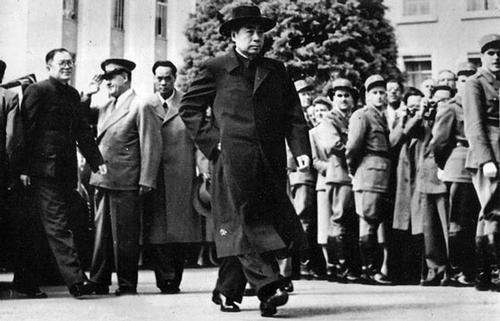
During this period, politics developed in two directions. At the socio-economic level, the situation normalized to the level after the Great Leap Forward. In the field of education and culture, the Maoist line of the Cultural Revolution remained the guiding principle.
At the top of the regime were Zhou Enlai, who advocated a modernization of the economy, and the radical "Cultural Revolution Group", which included Mao's wife, Jiang Qing. The conflict escalated when Zhou Enlai re-enlisted sidelined party officials, including Deng Xiaoping, who was even appointed deputy prime minister.
This uncertainty led to much unrest in the mid-1970s, especially in the major Chinese cities. Zhou Enlai died in early 1976, and was succeeded by the unknown Hua Guofeng. Again great demonstrations in favor of Zhou's politics followed, which were forcefully repressed; Deng Xiaoping was relieved of all functions.
During the eleventh party conference, Hua officially became prime minister and party leader, and Deng Xiaoping was rehabilitated again. In early 1978, a new constitution was passed by the Fifth National People's Congress, which reverted strongly to the original 1954 constitution.
Deng Xiaoping became the driving force for reform and modernization in many areas. Thus, the changes brought about by the Cultural Revolution came to an end and the break with Mao's legacy was final. All this was confirmed again at the third general meeting of the Central Committee of the Chinese Communist Party in December 1978.
This meeting also marked the end of Hua Guofeng and victims of Maoist terror were rehabilitated. Liberalization was implemented in the fields of the economy, culture, and also somewhat politically.
In 1980, People's Congress elected Zhao Ziyang as Prime Minister, becoming Deng Xiaoping's right-hand man in economic reform. Hu Yaobang succeeded Hua Guofeng as party chairman, but from that time on Deng Xiaoping was in fact China's most powerful man.
Student demonstrations and Falun Gong
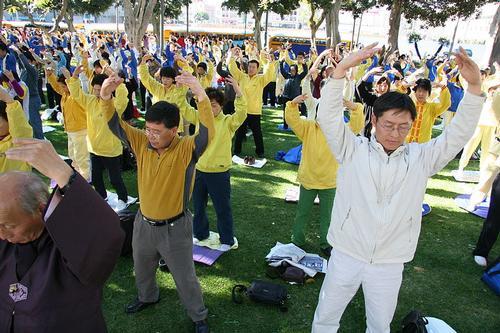
In the winter of 1986-1987, many student demonstrations took place, focusing on the call for political reform and far-reaching democratization of society. As a result, party chairman Hu Yaobang was able to leave because he was accused of a too soft approach to the students.
He was relieved in October 1987 by Zhao Ziyang, who was dumped again in April 1989. After Hu Yaobang's death, demonstrations and strikes continued at various universities. Hu hinted that he would like to meet the students' requirements, which cost him his job. Deng Xiaoping, meanwhile, had secured conservative Li Peng a prime minister.
After Hu Yaobang's death, the Tiananmen Square in Beijing was occupied by demonstrating students. With the help of the military, and by order of Deng Xiaoping, the square was forcibly evacuated on June 4, 1989 at the cost of probably hundreds of deaths and more injuries. Many students were arrested and the leaders of the demonstrations were severely punished.
The massacre led to an elimination between China and the United States, and only in 1993 the relationship between the two superpowers normalized again; Washington even proclaimed China as "most favored trading partner". In April 1993 talks between China and Taiwan were held for the first time since 1949.
When the US Congress invited Taiwanese President Lee Theng-hui in 1995, relations between China and the United States cooled again. The relationship with Japan was clouded in 1996 by Chinese nuclear tests.
Domestically, the social unrest among the peasant population increased due to a sharp rise in food prices, and many of them moved to the cities.
Deng Xiaoping died in February 1997 and was tentatively succeeded by Jiang Zemin as party chairman, president and commander in chief of the military. The positions of Jiang Zemin and Li Peng were further strengthened in September of that year at the First Plenary Session of the Fifteenth Central Committee.
In February 1998, Li Peng was succeeded as Prime Minister by reformist Zhu Rongji. He wanted to tackle the strong bureaucracy and implement further economic liberalization. Dissidents and unrest in rural areas such as Tibet and Xinjiang were traditionally combated. Forced massive immigration of Han Chinese to the Uighur region led to serious unrest. According to Amnesty International, 200,000 people were arrested and detained in labor camps in China in 1997.
In June 1998, U.S. President Clinton visited China, the first presidential visit since the 1989 Tiananmen Square massacre.
In 1999, the Beijing government faced a new religious movement, the Falun Gong (FLG) or Falun Dafa ("The Great Law of the Dharma Wheel"), founded by Li Hongzhi, a man from northwest China who lives in New York . His teaching is a mixture of themes and practices from the traditional Chinese religion that are presented in accordance with the views of modern science. In protest of the harassment and harassment by the authorities, 10,000 FLG supporters held the first mass demonstration in Beijing on 25 April 1999 since the Tiananmen Square massacre of 4 June 1989. In the following months, demonstrative meetings were held regularly. Falun gong supporters disrupted and on July 22, 1999, the Ministry of Civil Affairs officially declared Falun gong an illegal movement.
In October, the Falun gong was classified as a religious 'sect', and alleged top figures of the Falun gong were arrested from mid-October, and on October 30, a new law was also passed on 'religious sects' saying that the death penalty can be pronounced, when "religious sects" seriously jeopardize state security.
Sino-US relations were severely strained in 1999 by the NATO bombing in the context of the air war against Serbia on May 7 at the Chinese Embassy in Belgrade. Three people were killed and 27 injured. NATO stated that the bombing was a mistake caused by the use of outdated maps, although rumors had circulated that the United States suspected China of using the embassy for pro-Serb support.
21st century
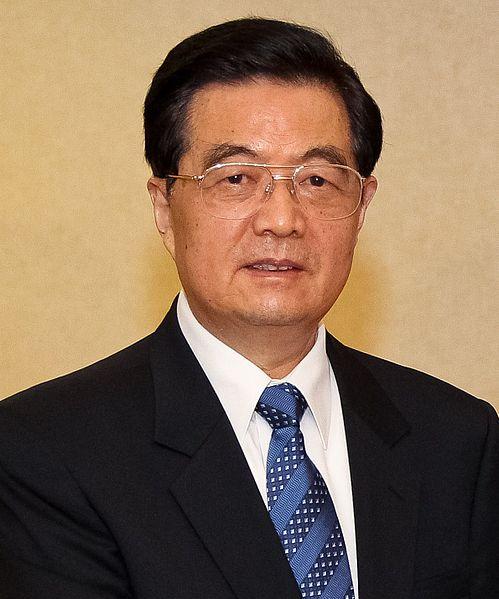 China Hu Jintao ChinaPhoto: Dilma Roussef CC 2.0 Generic no changes made
China Hu Jintao ChinaPhoto: Dilma Roussef CC 2.0 Generic no changes made
In the year 2000, the tenth five-year plan (2001-2005) setting out a reform path is adopted. The spearheads of this plan are improving the standard of living and restructuring agriculture and state-owned companies.
In mid-March 2003, the Chinese People's Congress appointed Hu Jintao as the new head of state. He succeeded 76-year-old President Jiang Zemin, who was re-elected as commander-in-chief of the military. The parliament elected Wu Bangguo as the new chairman. He succeeded Li Peng. On April 26, 2004, the Standing Committee of the National People's Congress, the Parliament of China, decided that in 2007 the people of Hong Kong should not be entitled to directly elect its supreme leader, the chief executive, in the parliamentary elections held in Hong Kong on September 12, 2004 prodemocratic parties achieved 25 out of 60 seats, a profit of three seats. The Beijing-minded parties retained their 34 seats. The number of independent candidates fell from four to one. In September 2004, Jiang Zemin also handed over the chairmanship of the powerful Central Military Commission (CMC) to President Hu Jintao.
The National People's Congress (NPC), the Chinese parliament, formally holds the highest state authority. The approximately 3000 members are elected indirectly for a period of five years. 2,937 members attended the last NPC session in March 2006. The role of the NPC mainly consists in ratifying decisions taken by the top of the CCP and submitted to the NPC through the State Council. The State Council is the central government, making it China's highest executive body. In July 2006, the world's tallest railway line to Tibet opens. In April 2007, President Hu Jintao heads a trade mission to Africa. China invests billions of dollars in Africa. In March 2008, five months before the Beijing Olympic Games, which start on 08-08-2008, serious disturbances break out in Tibet and are crushed hard. It is the most serious violence in 20 years.
In May 2008, tens of thousands died in an earthquake in Sichuan Province.
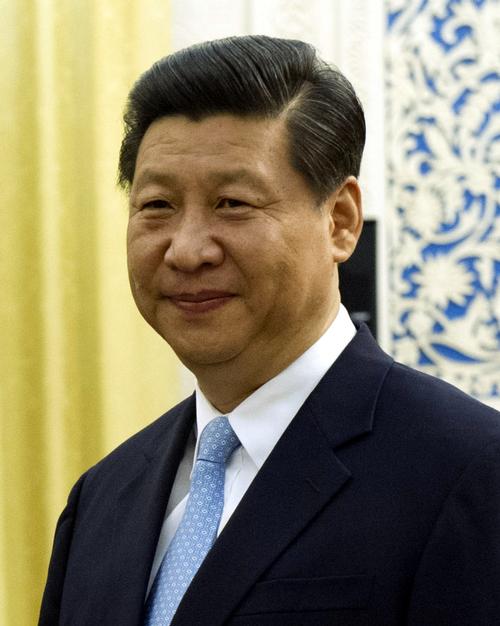 China Xi JinpingPhoto: Erin A. Kirk-Cuomo in the publlc domain
China Xi JinpingPhoto: Erin A. Kirk-Cuomo in the publlc domain
In July 2008, Russia and China resolved a 40-year-old border dispute. In August 2008 Beijing is host, of the Olympics. In November 2008, China will also suffer from the global economic crisis and the government will take stimulus measures. In July 2009, serious ethnic violence broke out in Xinjiang Province. One-child politics first came under pressure following comments from officials from Shanghai who called for a second child to combat aging. In January 2010, there were tensions with the United States over China's control of the Internet and the cyber attacks on human rights defenders. In March 2010, Google decided to operate via Hong Kong to avoid censorship. China remains powerful because it is a large market.
In February 2011, China overtakes Japan and becomes the second largest economic power in the world. In March 2012, the party chief Bo Xilai falls into disgrace, his wife is sentenced to a deferred death penalty in August 2012 after her confession of the murder of British businessman Neli Heywood. In March 2013, Xi Jinping became the new president as part of party renewal. In September 2013, Bo Xilai gets a life sentence because of bribery and abuse of power. In late 2013, the one-child is politically softened, and in December, China will make a moon landing for the first time in 37 years. In May 2014, China signed a deal with Russian Gazprom to get gas for 30 years. In October 2015, China's one-child policy will officially end. In November of that year, historical talks, for the first time since 1949, take place between Xi Jinping and Taiwanese leader Ma Ying-jeou. China's economic growth will dampen in 2015, 2016 and 2017, the IMF predicts a further decline over the coming years. In April 2017, President Xi meets with US President Donald Trump, the focus of the talks is on trade. In October 2017, Xi is placed on a pedestal at the Congress of the Communist Party, he is considered to be the same level all founder Mao.
In March 2018, the annual legislative assembly of the National People's Congress votes to remove a two-term limit for the presidency from the constitution, allowing Xi Jinping to remain in office longer than the conventional decade for recent Chinese leaders. In April 2018, China announced that it will impose 25% trading tariffs on a list of 106 U.S. goods, including soybeans, cars, and orange juice, in retaliation for comparable U.S. tariffs on about 1,300 Chinese products. In Hong Kong, there will be months of protests against the government and for democracy in 2019, involving violent clashes with the police, over a proposal to allow extradition to mainland China. In January 2020, there is an outbreak of the Covid-19 coronavirus in Hubei province. The virus spreads worldwide. A security law will enter into force in July 2020, increasing China's hold over Hong Kong. US President Trump announces sanctions, China is also imposing sanctions in retaliation.
Sources
China
Cambium
China
Informatie Verre Reizen
Eijck, F. / Reishandboek China
Elmar
Floor, H. / China
Stichting Teleac
Harper, D. / China
Kosmos-Z&K,
Jansen, I. / China
Gottmer/Becht
Knowles, C. / China
Van Reemst
MacDonald, G. / China
Kosmos-Z&K
CIA - World Factbook
BBC - Country Profiles
Last updated June 2025Copyright: Team The World of Info